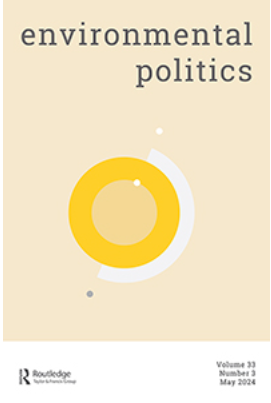美国地方政府官员的种族意识形态和对环境不平等的看法
IF 5.2
1区 社会学
Q1 ENVIRONMENTAL STUDIES
引用次数: 0
摘要
摘要最近的学术研究认为,国家的种族压迫是环境不平等形成的核心,这对国家实现环境正义的依赖提出了质疑。另一些人则认为,国家并非铁板一块,而是唯一有能力行使足够权力来解决环境不平等问题的机构。我通过对美国地方政府官员(N = 691)的调查参与了这一讨论。我发现,官员们倾向于进行不分肤色的环境种族主义;也就是说,官员们倾向于通过无视肤色的种族意识形态来理解环境不平等问题。研究结果支持了批评环境正义学者的论点,他们质疑国家应对环境种族主义问题的内在能力。然而,官员们观点的差异也表明,该州是一个政治争论的场所,许多官员都认识到环境不平等和种族主义的现实,并支持政府干预来解决这个问题。关键词:环境正义政府官员政策支持色盲环境种族主义披露声明作者未报告潜在利益冲突。虽然态度调查的研究人员经常将“我不确定”或类似的答案视为缺失,但在这种情况下,测量不是态度的。因为这是一个准确性的问题——识别事实正确陈述的能力——在这种情况下,“I ' m not sure”实际上是不准确的。为了评估这一决定的适当性,我(a)进行了一组敏感性分析,其中随后的回归分析以一种将“我不确定”视为缺失的准确性措施重新运行,(b)检查了一系列t检验,通过教育、政治认同、性别和收入等人口统计学特征比较了“我不确定”回答的数量。对于前者,新的回归结果在系数、标准误差或统计显著性方面没有产生任何有意义的差异。对于后者,没有大学学位的受访者(与有大学学位的受访者相比)和共和党人(与民主党人相比)的比例略高。(分别为4和0.5)更多的回答是“我不确定”,表明这可能是一种社会可取性偏见:通过回答“我不确定”来避免回答“不”。但在这种情况下,这将证明而不是挑战这里使用的编码。对于大多数受访者支持环境正义政策这一发现,一个重要的警告是,用于评估支持度的问题没有区分普遍主义、基于贫困或基于种族的政策。也就是说,通过使用一个更一般的框架问题,受访者能够推断出政策可能采取的一些可能形式。考虑到色盲种族意识形态与环境不平等信念之间的密切关系——尤其是对政策的支持——未来的研究很可能会发现,如果环境正义政策针对最需要政策支持的种族边缘化社区,地方政府官员如何看待环境正义政策存在实质性差异。本文章由计算机程序翻译,如有差异,请以英文原文为准。
Color-blind racial ideology and beliefs about environmental inequality among local US government officials
ABSTRACTRecent scholarship argues that racial oppression by the state is central to the formation of environmental inequalities, calling into question reliance on the state to achieve environmental justice. Others argue that the state is not monolithic and is the only institution capable of wielding sufficient power to address environmental inequalities. I engage with this discussion through a survey of US local government officials (N = 691). I find that officials tend to engage in color-blind environmental racism; that is, officials tend to understand issues of environmental inequality through the lens of color-blind racial ideology. Findings support the arguments of critical environmental justice scholars who question the state’s inherent capacity to respond to issues of environmental racism. However, variance in officials’ views also suggest that the state is a site of political contestation with many officials both recognizing the reality of environmental inequality and racism and supporting government intervention to address it.KEYWORDS: Environmental justicegovernment officialspolicy supportcolor-blind environmental racism Disclosure statementNo potential conflict of interest was reported by the author.Notes1. While attitudinal survey researchers often treat ‘I’m not sure’ or equivalent answers as missing, in this case the measure is not attitudinal. Because this is a question of accuracy – the ability to identify factually correct statements – ‘I’m not sure’ in this case is, in fact, inaccurate. To evaluate the appropriateness of this decision, I (a) ran a set of sensitivity analyses in which the ensuing regression analyses were re-run with an accuracy measure that treats ‘I’m not sure’ as missing and (b) examined a series of t-tests that compared the number of ‘I’m not sure’ responses by demographic characteristics of education, political identity, gender, and income. Regarding the former, the new regression results did not yield any meaningful differences in coefficients, standard errors, or statistical significance. Regarding the latter, respondents without a college degree (compared to those with a college degree) and Republicans (compared to Democrats) had slightly (.4 and .5, respectively) more ‘I’m not sure’ responses, indicating what was likely a form of social desirability bias: avoiding answering ‘no’ by answering ‘I’m not sure’. But in this case this would justify rather than challenge the coding used here.2. A significant caveat to the finding that a majority of respondents support environmental justice policy is that the question used to evaluate support does not distinguish between universalistic, poverty-based, or race-based policies. That is, by using a more generically framed question, respondents were able to infer a number of possible forms that policy could take. Given the strong relationship between color-blind racial ideology and beliefs about environmental inequality – especially support for policy – it is likely that future research would find substantial differences in how local government officials view environmental justice policy if it were targeted at racially marginalized communities most in need of policy support.
求助全文
通过发布文献求助,成功后即可免费获取论文全文。
去求助
来源期刊

Environmental Politics
Multiple-
CiteScore
11.70
自引率
5.50%
发文量
60
期刊介绍:
Environmental Politics is concerned with four aspects of the study of environmental politics, with a primary, though not exclusive, focus on the industrialised countries. First, it examines the evolution of environmental movements and parties. Second it provides analysis of the making and implementation of public policy in the area of the environment at international, national and local levels. Third, it carries comment on ideas generated by the various environmental movements and organisations, and by individual theorists. Fourth, it aims to cover the international environmental issues which are of increasing salience.
 求助内容:
求助内容: 应助结果提醒方式:
应助结果提醒方式:


